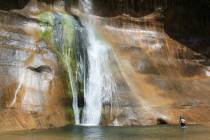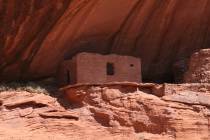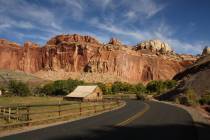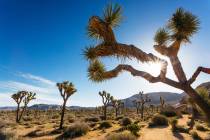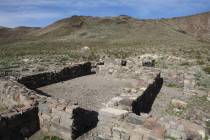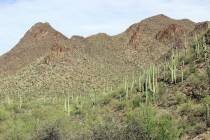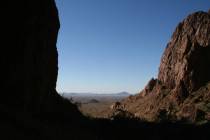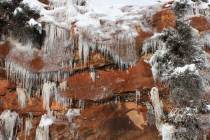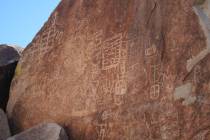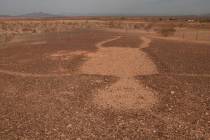Explore close to home at Historic Railroad Tunnel Trail
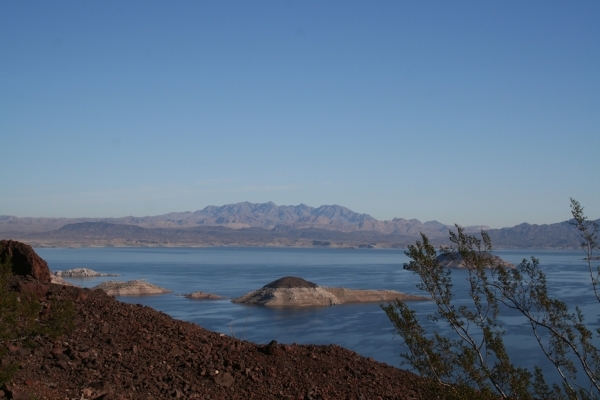
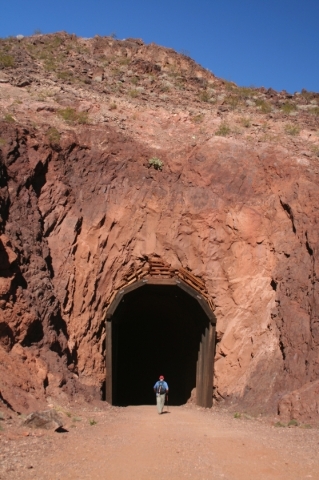
Getting outdoors for some fresh air and exercise this weekend could possibly solve two problems at once: overeating at Thanksgiving and keeping your family and out-of-town guests busy.
A great outing, now that the weather has cooled off, would be the Historic Railroad Tunnel Trail in Lake Mead National Recreation Area. This trail has such an important past that, in June, it was designated as a National Historic Trail. And not only is it easy to get there, but once on the trail, you’ll find an easy gravel surface with five tunnels to walk through. Besides historic interest, you will also find excellent, far-reaching views of the lake and opportunities to see desert bighorn sheep.
This trail is suitable for hiking, running, mountain biking and jogging strollers (regular strollers are not suitable.) This almost entirely flat and wide trail makes for an easy outing, but there are several areas along the trail that have severe drop-offs, so small children need to be watched diligently.
For an easy outing, I would recommend hiking the trail through the fifth tunnel and returning to the trailhead, which would be about 4.3 miles roundtrip. You can also add another 3 miles roundtrip by hiking past the last tunnel and continuing all the way to Hoover Dam. This last segment is a bit more strenuous, for the downhill hike to the dam necessitates an uphill leg on the return. This last segment can be done only in daylight hours, as the gate after the fifth tunnel gets locked.
The trailhead is located at an elevation of about 1,565 feet, so you can expect temperatures a couple of degrees warmer than in Las Vegas. From the parking area, access the paved walkway for about 300 yards, and go left onto the railroad bed itself.
This rail bed was used to bring supplies for building Hoover Dam in the 1930s. The government and six large contractor companies, collectively called Six Companies Inc., built three railway segments, which totaled almost 30 miles, connecting cement mixing plants, quarry pits and other pertinent areas. Today’s Railroad Tunnel Trail was the segment that ran from Boulder City down to Hemenway Wash, and then to Hemix, a concrete mixing plant. After the dam was finished in 1935, many of the 30 miles of track were flooded or damaged, except for this section. It was used occasionally until 1961 when a final shipment of a generator was delivered to the dam’s power plant. The following year, the tracks were removed and sold for scrap.
After walking about ¾ of a mile, look up on your right to the top of a canyon, and you will see the Hoover Dam Lodge. On the left of this canyon, you will see a narrow spur trail that leads up to the lodge, where there is an alternative starting point for this hike. That trailhead is located at the parking area to the east of the lodge, below the helicopter launch pad.
Continuing on the main trail about ¼ mile farther, look down the embankment, and you will see some large, broken pieces of cylindrical concrete. These were concrete plugs that were removed from the dam when the turbines were installed.
From here, you will be approaching the first of the five tunnels. The tunnels are all about 300 feet long and about 25 feet in diameter, oversized to accommodate the penstock sections and other large equipment needed in the dam project.
If you are headed out there this holiday weekend, be sure to arrive at the trailhead early in the morning, as the trail is extremely popular and gets crowded. There are bathrooms in the parking area, at the Hoover Dam Lodge, after the fifth tunnel, and at Hoover Dam.
— Deborah Wall is the author of “Great Hikes, A Cerca Country Guide” and “Base Camp Las Vegas: Hiking the Southwestern States,” published by Stephens Press. She can be reached at deborabus@aol.com.
DirectionsFrom Las Vegas, take U.S. Highway 93 south through Boulder City for about 25 miles to Lake Mead National Recreation Area. Turn left on Lakeshore Road, drive 0.4 miles and go right into the parking area for the trailhead. This will be 0.1 miles past the Alan Bible Visitor Center entrance.



